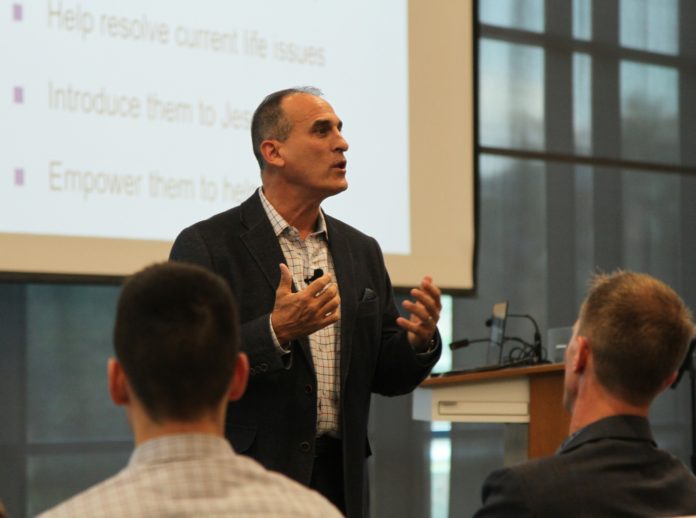
Julia Vergara | Staff Writer
The founder and CEO of PacMoore challenged Baylor students Thursday evening with the question, “How can your job be one of the places where you can best serve God?”
Bill Moore’s presentation, titled “Faith in the Workspace and Marketplace,” took place at 4 p.m. in the Paul L. Foster Campus for Business and Innovation.
“The best place to reach people is in the marketplace — that’s where they go to work,” Moore said. “If you go to church and try to reach the lost — the lost aren’t in church. They don’t go there so the best place to reach people is in the workplace.”
Moore said his Indiana-based company, PacMoore, is food manufacturing with a mission to transform lives. He began the presentation by speaking about Jamie Wright, a PacMoore employee who went through his own life transformation at PacMoore.
Wright had a difficult background, Moore said. When he first came to PacMoore, he was struggling and having a difficult time working in a corporate setting.
“Typically men like me would say, ‘That young man needs to go find success somewhere else.’ But that’s not what we did,” Moore said.
Instead, with the help of the company’s spiritual leadership, Wright was able to turn his life around and is currently an incredibly productive individual that consistently meets his goals every month, Moore said.
“I look at where I am now,” Wright said in a pre-recorded video that was played at the event. “Today, I have an incredible marriage. I’m a father to a 2-year-old son; I have another due in a few weeks. It’s the type of life transformation that I would just pray that other people in other companies will get to experience one day.”
PacMoore’s company strategy is unique, Moore said. Unlike many other companies, they have an employee strategy to help transform lives.
According to Moore, the steps in the company’s employee strategy include training employees for business, increasing their earning capacity, creating meaningful relationships, helping them resolve any current life issues, introducing them to Jesus Christ and empowering them to help others.
“Our strategy is what’s unique,” Moore said. “Most businesses don’t have an employee strategy. They have an employee retention strategy. They have employee growth strategy. But not a ‘How am I going to reach and transform my employees?’ strategy.”
In most companies, life transformation is not happening. There are not a lot of companies taking that strategy because it is expensive and it takes a lot of time, Moore said.
“We have a different purpose and it’s for you to come build meaningful relationships with us — and us with you — so that your life starts to change and you can address the things that are really holding you back,” Moore said.
PacMoore implements several spiritual tactics, Moore said. For example, a giant portion of the company’s budget goes toward being able to have seven chaplains available to employees. The company also offers Bible studies and prayer groups to their employees.
“What we typically try to do is get them back to their church of origin,” Moore said. “We see a lot of people come from the Catholic church; we don’t try to convert them to Protestantism. Some people are Jewish, some people are Muslim — we try to get them back to their church of origin because that’s where we think they’re going to get connected and where they’re going to develop spiritually.”
At the end of his presentation, Moore asked the students, “How will you integrate your work with your Christian commitment?”
It is typically difficult for young Christian’s coming out of college to answer that question, Moore said.
There is a misconception about what “real” Christians are supposed to do for a job after college, Moore said. Many people perceive missionary work, working in a church or in a nonprofit position as the jobs for “real” Christians.
However, Moore said that is not true. To prove his point, he showed students a list of Christian business leaders. Some included Chick-Fil-A’s Truett Cathy, Walmart’s Sam Walton and Standard Oil Company’s John Rockefeller.
“Look at the amount of money they generated, the amount of jobs they generated, the amount of lives they touched because of the businesses they’ve created,” Moore said. “That’s a powerful testimony to what you can do as a Christian business leader.”





